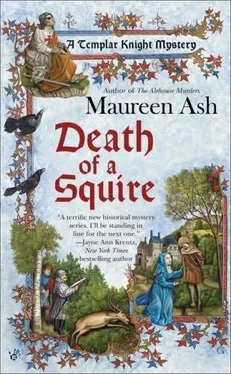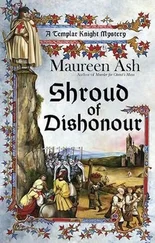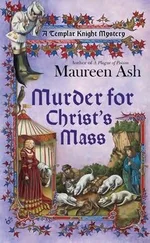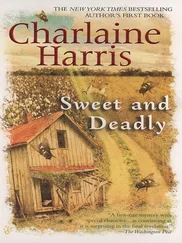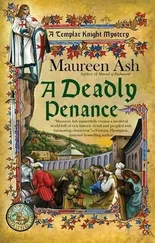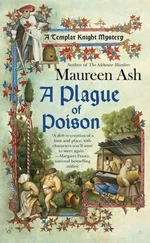Maureen Ash - Death of a Squire
Здесь есть возможность читать онлайн «Maureen Ash - Death of a Squire» весь текст электронной книги совершенно бесплатно (целиком полную версию без сокращений). В некоторых случаях можно слушать аудио, скачать через торрент в формате fb2 и присутствует краткое содержание. Жанр: Исторический детектив, на английском языке. Описание произведения, (предисловие) а так же отзывы посетителей доступны на портале библиотеки ЛибКат.
- Название:Death of a Squire
- Автор:
- Жанр:
- Год:неизвестен
- ISBN:нет данных
- Рейтинг книги:3 / 5. Голосов: 1
-
Избранное:Добавить в избранное
- Отзывы:
-
Ваша оценка:
- 60
- 1
- 2
- 3
- 4
- 5
Death of a Squire: краткое содержание, описание и аннотация
Предлагаем к чтению аннотацию, описание, краткое содержание или предисловие (зависит от того, что написал сам автор книги «Death of a Squire»). Если вы не нашли необходимую информацию о книге — напишите в комментариях, мы постараемся отыскать её.
Death of a Squire — читать онлайн бесплатно полную книгу (весь текст) целиком
Ниже представлен текст книги, разбитый по страницам. Система сохранения места последней прочитанной страницы, позволяет с удобством читать онлайн бесплатно книгу «Death of a Squire», без необходимости каждый раз заново искать на чём Вы остановились. Поставьте закладку, и сможете в любой момент перейти на страницу, на которой закончили чтение.
Интервал:
Закладка:
“I think, Gerard, this matter would be best discussed privily, do you not agree? Afterwards, Richard can give us the king’s messages.”
Camville grunted and rose to his feet. He was by nature a taciturn man, and an indolent one, content to let his wife deal with any demanding matters that arose. Reluctant though he was to leave the comfort of the hall and become embroiled in yet another discussion of the squire’s murder, he recognised the need for his presence.
“De Marins should also attend,” he said to his wife shortly; then, to his brother, “And you, too, William. This matter touches both of us.”
Nicolaa sent Alain, who was standing rigidly behind Gerard’s chair, to find Bascot and direct him to attend her without delay. Then she made her excuses to the company and they all left the hall.
Bascot came away from the meeting with Godfroi and Marie de Tournay with a feeling that he was now more familiar with the character of the murdered squire. The boy certainly did not seem to have many redeeming qualities. Quite the reverse in fact.
Like Joscelin de Vetry, the brother and sister had not been aware that Hubert had been murdered, or that his body had been desecrated by crows. Nicolaa had explained that she had not wanted to cause the boy’s mother undue anguish and had therefore left the details of her son’s death untold when she had sent her message.
“I fear she will be much distressed,” she said. “De Vetry intends to have Hubert’s coffin sealed, but even so, some explanation will be required.”
“I will tell her,” Marie said firmly, although her eyes were awash with unshed tears. In appearance she was very like her brother, with dark eyes and hair, but there the resemblance ended. The intensity that was etched on every plane of her brother’s face was lacking in Marie. She was strong, but not unbending, and there was compassion in her voice when she spoke of her stepmother.
“My father married Hubert’s mother when he was elderly,” she had told them, at which William Camville nodded. It had been at Fulk de Tournay’s request that he had taken Hubert to train for knighthood. Soon after the boy had become a part of William’s household the elder de Tournay had died, after suffering many long months from a wasting fever.
“Our mother had been dead for some years when my father married again,” Marie had gone on to explain. “The household had long been in need of a woman’s hand, for I was too young to take charge. Hubert’s mother is kind, too kind, perhaps. When he was born she was overly protective of him, cosseting him and keeping him by her when he should have been out from under her skirts.” Marie shrugged. “It made him petulant. When he was not given something he wanted, he would run to her, begging her indulgence. She never refused him. Even when he told lies or stole some trifling object-which he did quite often-he was never punished. And my father was too ill by then to take him under his hand. My brothers attempted to chastise him when he would do some mischief, but”-Marie gave an impatient sigh-“his mother always defended him, giving him a tidbit to eat and telling him he was not to be upset at their angry words. It was hopeless.”
“By the time he went to your household, Sir William, his nature was set in ways that were not commendable,” Godfroi added, his face wooden. “But he is our blood kin and his murder must be avenged.”
Gerard Camville, pacing the room as was his usual habit, had listened to them in silence. Then, tersely, he told them of the murder of the charcoal burner and his sons and how an outlaw had been taken while poaching the sheriff’s deer.
“It is more than likely that brigands are behind all of these deeds. If the one that has been captured did not carry out the acts himself, I will warrant that he knows who did,” the sheriff said. “He will admit to no crime other than taking the deer, but I will get the truth from him before I am through. If he killed your half brother, you may rest assured he will pay-and pay dearly-for the doing of it.”
As he spoke the words there was no doubt in anyone’s mind that the sheriff would carry out his promise. Gerard Camville was known for his brutality. The outlaw would not be spared any pain before he faced his final moments.
Bascot had left the room with the de Tournay brother and sister, leaving Richard alone with his parents and uncle for their private conversation. It was obvious that Marie was exhausted. The hurried journey in winter weather and the distress of the news she would have to convey to Hubert’s mother had taken their toll. Leaving her in her brother’s care, Bascot asked if he could meet with them in the morning when they were both rested, to discuss if there could be any other reason for Hubert’s murder besides a chance encounter with outlaws.
Seventeen
Fulcher was being kept in a small holding cell near the barracks. His wrists were still pinned to the sturdy branch that Copley had ordered his men to place across his shoulders and he was slumped on the dirt floor, head bowed and eyes glassy. He was so near to unconsciousness that he paid no heed to the two men who were beating him, nor to Roget and Ernulf, who stood watching.
“He is either stupid or fearful of a greater punishment,” Roget said to the serjeant. “My men have been at him for the best part of the morning and still he will not admit that he had any hand in the murder of the boy.”
Ernulf made no comment. He was here only at Lady Nicolaa’s request. Inflicting pain on a person unable to defend himself was not something for which he had much liking. He knew it was necessary at times, but fair battle was more to his taste than this torturing of a helpless man, however great his crime.
The two men who had been systematically beating the outlaw were members of Gerard Camville’s town guard, of which Roget was captain. They were both evil tempered and surly, and seemed to enjoy their task. Their smirking grins had produced an angry knot in Ernulf’s gut. He longed to escape the dimness of the small windowless cell, lit only by a few flaring cressets set in sconces on the wall. The smell of blood and sweat permeated the air.
“Perhaps he is innocent of the boy’s death,” Ernulf said. “Although even if he is not, he is a rare man not to admit it after a beating like that.”
Roget gave Ernulf a sideways glance. The scar that ran down the side of the captain’s face puckered as he mused on the serjeant’s words. “That is my opinion also, mon ami,” he finally said. “The sheriff will not be pleased at my lack of success, but I do not think we will get any further with this miscreant. Guilty of taking the deer he may be, but of the other…I am beginning to doubt it.”
With a brief command to his two men, Roget stopped Fulcher’s punishment and told them to leave. When they had gone, laughing as they did so about how great a thirst their exertions had built up, Roget went forward and released the outlaw’s wrists from the pole. Fulcher slumped to the ground, eyes shut and breath shallow. Between them, Roget and Ernulf lifted the comatose brigand onto a straw pallet and threw a threadbare blanket over him.
“I’ll send one of my men with food and water, although I think perhaps it will be futile,” Ernulf said, leaning over and feeling the pulse in Fulcher’s throat. “He is still alive, but barely. Your men did their work a little too well.”
Roget regarded the outlaw, the bruises that swelled his face, the split lips and grotesquely puffed eyelids. The rough tunic he had been wearing was split in several places, blood seeping through the torn cloth like sap bubbling from the cracked bark of a tree. Roget gave a Gallic shrug of his burly shoulders. “Perhaps. But if he dies, it may be a mercy. He will hang whether he killed the boy or not. It is the penalty for poaching and the sheriff will be only too pleased to inflict the punishment.”
Читать дальшеИнтервал:
Закладка:
Похожие книги на «Death of a Squire»
Представляем Вашему вниманию похожие книги на «Death of a Squire» списком для выбора. Мы отобрали схожую по названию и смыслу литературу в надежде предоставить читателям больше вариантов отыскать новые, интересные, ещё непрочитанные произведения.
Обсуждение, отзывы о книге «Death of a Squire» и просто собственные мнения читателей. Оставьте ваши комментарии, напишите, что Вы думаете о произведении, его смысле или главных героях. Укажите что конкретно понравилось, а что нет, и почему Вы так считаете.
